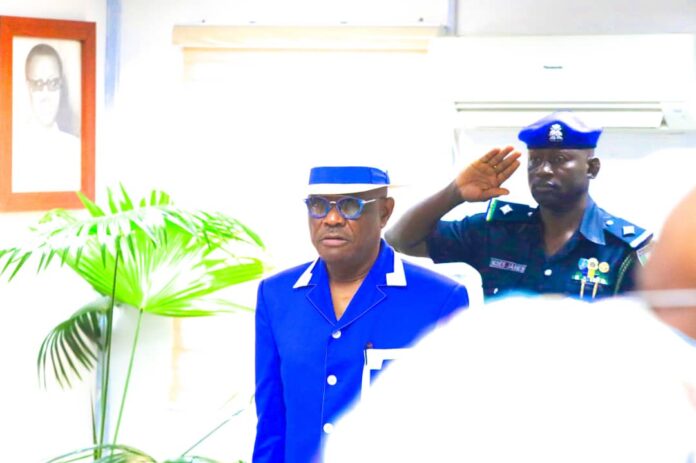In an assertion that has stirred discussions across Nigeria, Nyesom Wike, the Federal Capital Territory (FCT) Minister, boldly declared that he is not an Igbo man. Instead, Wike, who hails from Rivers State, identifies as an Ikwerre person. His remarks came during a media interaction in Abuja on Sunday, where he responded to questions surrounding the recent election of John Azuta Mbata as the President-General of Ohanaeze Ndigbo, the influential socio-cultural organization representing the Igbo people.
“I am an Ikwerre man, not an Igbo man. I don’t have a problem with Igbo people, but my identity remains non-negotiable,” Wike emphatically stated, adding that he would never compromise his heritage for the sake of political or social recognition.
Wike’s Identity and Its Political Implications
The declaration is significant, not only because of its personal implications for Wike but also for the wider political landscape. The Minister’s comments have rekindled discussions about ethnic identity in Nigerian politics, particularly regarding the various regional groups within the country. Wike’s strong affirmation of his Ikwerre identity appears to be a strategic distancing from the Igbo ethnic group, despite Rivers State being home to a considerable number of Igbos.
Wike was responding directly to recent speculations that linked him to Ohanaeze Ndigbo, a sentiment that may have grown stronger due to his public interactions with prominent Igbo figures. Despite his political stature, Wike has consistently separated his political actions from ethnic affiliations, often emphasizing his focus on development over ethnic or tribal politics.
“I’m an unrepentant Ikwerre man. I am not a member of Ohanaeze. If Mbata, or anyone for that matter, wants to associate with the Igbo people, that’s his personal choice, but it has nothing to do with my identity,” Wike declared.
The Rise of John Azuta Mbata: A Historic Moment for Rivers State
Wike’s statement came amidst the election of John Azuta Mbata as the new President-General of Ohanaeze Ndigbo, a position that had been left vacant following the death of the former President-General, Emmanuel Iwuanyanwu. Mbata, a former senator who represented Rivers East in the National Assembly from 1999 to 2007, is considered an important figure in both Rivers State and the broader Igbo community in the South-East.
Mbata’s election marks a significant moment in Nigerian political and cultural history, as it is rare for a non-Igbo person to lead the prestigious Igbo organization. His election is seen as an attempt to bridge the gap between the Igbo and other ethnic groups within the South-South region, though Wike’s comments suggest that not everyone is on board with this vision.
Political Dynamics in Rivers State: The Wike-Fubara Rift
This public assertion of his Ikwerre identity also comes at a time when Wike’s political relations within Rivers State are under scrutiny. The FCT Minister has been at odds with Governor Sim Fubara of Rivers State, who succeeded Wike in 2023. Their ongoing feud has led to significant political rifts within the state, particularly regarding the control of political resources and influence.
In a separate part of his media interaction, Wike addressed the growing tensions between himself and Governor Fubara. He expressed his disappointment with Fubara’s refusal to fully comply with President Bola Tinubu’s peace initiatives to resolve their differences. “Fubara should have gone back to President Tinubu if they couldn’t meet the expectations outlined during the peace talks. It’s about leadership, accountability, and putting Rivers State above personal interests,” Wike remarked.
This power struggle between the two leaders has resulted in a fractured political scene in Rivers, with several members of the state House of Assembly defecting to the opposition All Progressives Congress (APC). Consequently, the state now faces a dual leadership structure in its legislative arm, with factional speakers and parallel assemblies emerging.
Wike’s Leadership Style: A Defiant Stand
Wike’s firm refusal to be associated with the Igbo people or Ohanaeze Ndigbo could be interpreted as part of his broader political philosophy of placing his individual and regional identity above tribal or ethnic affiliations. This stance is not entirely new for the Minister, who has always positioned himself as a champion of the people of Rivers State, irrespective of their ethnic background.
His defiance also sends a clear message to his political adversaries and supporters alike: Wike is not someone who will be easily swayed or manipulated by political pressures to align with any group or organization. This independence and commitment to his roots may be what has kept him a significant figure in Nigerian politics, despite the shifting allegiances and ethnic rivalries that have often dominated the political discourse.
“I will never, for anything, deny my identity just to be recognized,” Wike reiterated, underscoring the personal conviction behind his stance. His statement not only reiterates his commitment to his heritage but also challenges the conventional expectations of ethnic loyalty in Nigerian politics.
The Larger Ethnic Debate in Nigeria
Wike’s comments also bring to the forefront the larger ethnic and regional politics that continue to define Nigerian public life. In a country where ethnic identity plays a significant role in political allegiance and leadership, Wike’s refusal to identify as part of the Igbo ethnic group, despite his interactions with Igbo political figures, is a reminder of the complexity of Nigerian politics.

